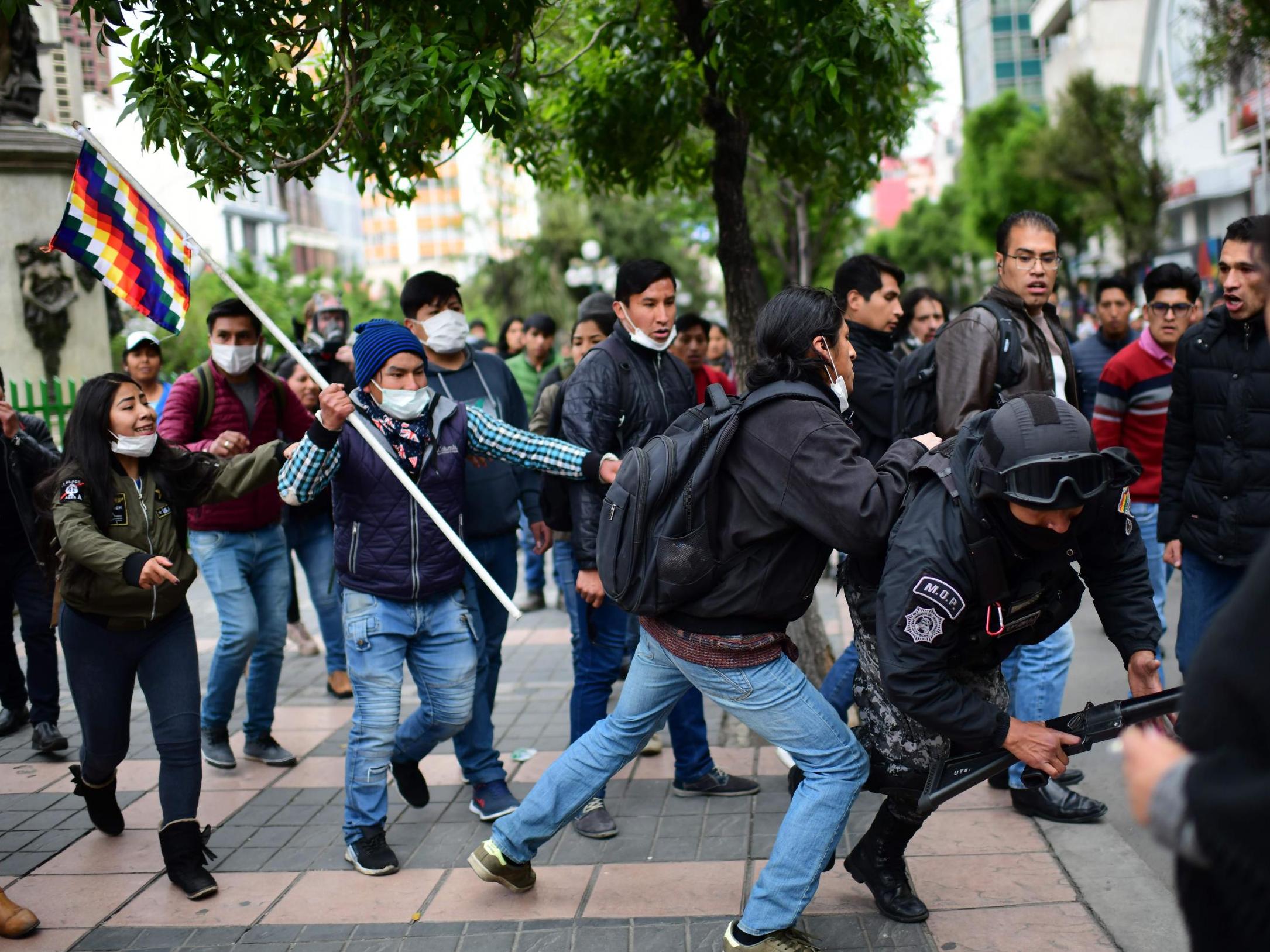Bolivia rocked by more violent clashes as Evo Morales warns government not to ‘stain themselves with blood’
Senator Jeanine Anez’s assumption of presidential power met with violent protests by supporters of Morales, who resigned from office on Sunday

Your support helps us to tell the story
From reproductive rights to climate change to Big Tech, The Independent is on the ground when the story is developing. Whether it's investigating the financials of Elon Musk's pro-Trump PAC or producing our latest documentary, 'The A Word', which shines a light on the American women fighting for reproductive rights, we know how important it is to parse out the facts from the messaging.
At such a critical moment in US history, we need reporters on the ground. Your donation allows us to keep sending journalists to speak to both sides of the story.
The Independent is trusted by Americans across the entire political spectrum. And unlike many other quality news outlets, we choose not to lock Americans out of our reporting and analysis with paywalls. We believe quality journalism should be available to everyone, paid for by those who can afford it.
Your support makes all the difference.Violent clashes among protestors and security forces have once again flared up in Bolivia, with former president Evo Morales warning government officials not to “stain themselves with the blood of the people”.
Supporters of Morales, who stepped down from office over a disputed presidential election before fleeing to Mexico, took to the streets of La Paz on Wednesday in protest against senator Jeanine Anez’s assumption of power earlier this week.
Fires were lit and rocks thrown by the crowds while police used tear gas in an attempt to disperse those who had gathered near the city’s presidential palace.
Lawmakers loyal to Morales have meanwhile been seeking to challenge the legitimacy of Anez’s appointment after she declared herself interim president.
They boycotted the session of congress called to formalise her claim to the presidency, preventing a quorum, and have been attempting to stage new counter sessions.
As the deputy senate leader, Anez stepped in to fill the political vacuum after Bolivia’s vice-president and the leaders of the senate and lower house joined Morales in resigning.
“Before the definitive absence of the president and vice president... as the president of the Chamber of Senators, I immediately assume the presidency as foreseen in the constitutional order,” she said during a parliamentary session on Tuesday night.
Anez’s appointment as interim leader has been endorsed by Bolivia’s Constitutional Court – as well as the United States, which announced its support on Wednesday.
Morales, the leader of the leftist Movement for Socialism party, which has governed Bolivia for the past 13 years, said he is “ready to return to pacify” the country.
He also denounced the decision by the Donald Trump administration to acknowledge the Anez government and cautioned those in power not to “stain themselves with the blood of the people”.
“This coup d’etat that has triggered the death of my Bolivian brothers is a political and economic plot that came from the US,” Morales said during a press conference on Wednesday.
Against a backdrop of violence and political volatility, Anez has sought to bring stability to the Bolivian government.
So far she has named members of her cabinet and appointed new personnel to lead the armed forces.
In her first address to the nation as interim president, Anez stressed that her position is “strictly provisional”, adding that she plans to “call for new general elections in the earliest possible time.”
“This is a transitional government,” Anez told CNN. “Obviously, as soon as we can, we will call general elections so the Bolivian people can have a president elected by us in a democratic manner.”
Anez will now need to form a new electoral court and get Congress, which is controlled by the Movement for Socialism party, to vote on a new election. All of this must be achieved by 22 January, when Morales’ current term was due to end.
Morales, under pressure from Bolivian military officials, resigned on Sunday shortly after an Organisation of American States audit reported widespread irregularities in last month’s election results. This followed weeks of violent protests, fuelled by allegations of electoral fraud, and controversy over the decision to allow the 60-year-old to run for a fourth term.

Bolivia’s first indigenous president subsequently arrived in Mexico under a grant of asylum, leaving his country behind in turmoil. His resignation still needed to be approved by both houses of Congress, and lawmakers could not assemble the numbers needed for formal sessions.
Anez forged ahead regardless, arguing that Bolivia could not wait.
Morales, a one-time llama shepherd from the Bolivian highlands, was first elected as president in 2006. He won praise for lifting millions out of poverty, increasing social rights and presiding over stability and high economic growth in South America’s poorest country.
He said the decision to relinquish power had been taken in response to mounting pressure and in order to stop fellow socialist leaders from being “harassed, persecuted and threatened”.
“While I have life I’ll stay in politics, the fight continues,” he said on Sunday. “All the people of the world have the right to free themselves from discrimination and humiliation.”
“The president of Mexico saved my life,” he added, thanking President Andres Manuel Lopez Obrador for granting him asylum.
Join our commenting forum
Join thought-provoking conversations, follow other Independent readers and see their replies
Comments